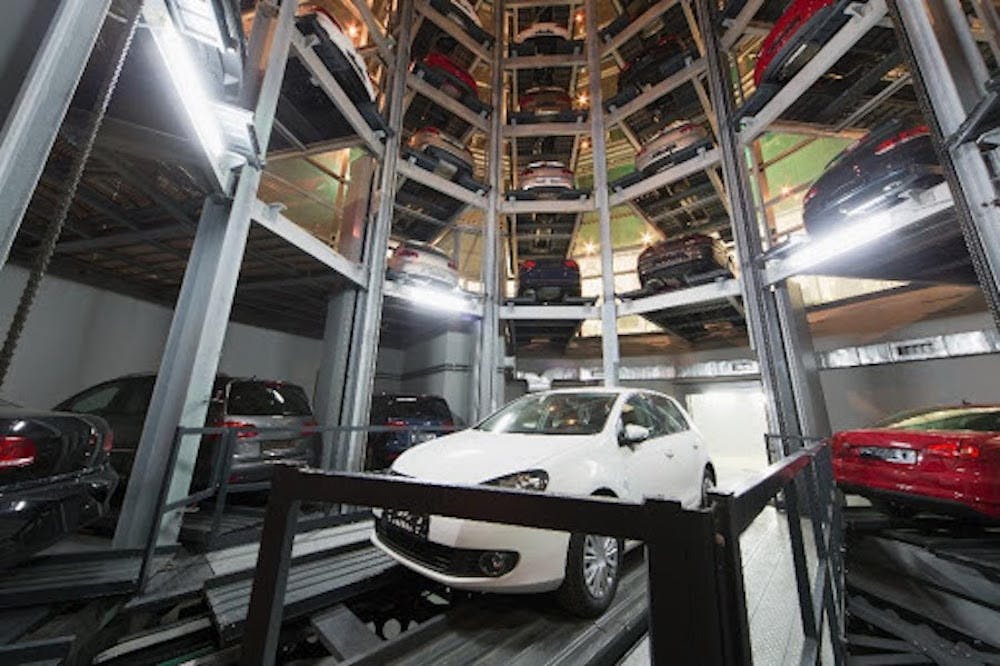From Redmond to South Lake Union, our area is well known as a dynamic center of research and development. So, it should come as no surprise that it is also becoming a center for modern car-parking solutions.
Building on some of the most expensive dirt in the nation, residential and office developers are working with tech companies to solve one of the bigger issues in modern urban construction: establishing an efficient parking hub to accommodate hundreds of vehicles in a constrained space. Leave it to the tech world to create a smarter solution to the age-old activity of parking.
Whether you call it automation or robotics, it’s a massive industry valued at about $63 billion and projected to nearly double by 2027, according to one forecast. Of course, the aim is to save time, money and safely increase performance of what, across many industries, are usually menial tasks such as parking a high volume of vehicles.
Automatic parking systems are not new. The first driverless system was opened in 1951 in Washington, D.C., and the modern-day variety has been around since the turn of this century. The largest high-tech, high-density system provides about 2300 parking spaces for a facility in Kuwait, while a system in Germany is supposedly the fastest, retrieving a vehicle without a driver in about 100 seconds.
The systems have primarily been developed to provide a high volume of spaces in an area challenged by either a high water table, tight building footprint or simply out of the desire to have modern conveniences. In Seattle, one condo project that plans to open in 2021 will feature what is believed to be the city’s first automated-valet parking service for a residential building.
Spire, the glass-and-steel triangular tower at the intersection of 6th Avenue, Wall Street and Denny Way, will be home to a nine-level, driverless parking system beneath the 41-story gleaming tower. It will be fun to see the subterranean, 266-slot, vehicle-filing system in action.
Drivers will pull in to one of three portal elevators within the entrance of the ground-level garage and wait for a signal to ensure the vehicle is appropriately positioned, similar to an automated car wash slot. Once signaled to turn off the engine, passengers leave the vehicle, take the keys, head toward their residential elevator and leave the rest to the auto-valet. From there, the system uses a rack and rail system to move the car to a predetermined parking slot in a frame that looks like a giant Excel spread sheet featuring neat rows and columns of spaces.
Spire is partnering with ParkPlus to install and maintain the automated system, which is similar to one the New Jersey-based company built last year in Florida for 208 vehicles in a narrow 26-story garage within a 51-story condo. Here’s a video of how that system works (Note: This video was added in November 2021 after the original version was removed from the source):
As explained by the Spire residential sales team, residents can call ahead from their home to retrieve the vehicle in advance of arriving to the garage waiting area. The retrieved vehicle will be oriented towards the exit to eliminate the need for the driver to back out. (Penthouse owners receive one parking space with the home purchase and an option for a second. Other residents seeking a space must pay a one-time $75,000 fee.)
The advantages to automated parking systems are pretty clear – and numerous. The spaces are more compact – approximately 225 sq. ft. compared to 320 sq. ft. in conventional parking structures – allowing for more total slots. The concept of driverless parking means the engine on hundreds of vehicles don’t run as long inside, reducing carbon emissions by about 80% compared to a self-driving garage.
In addition, there are economic benefits, with lower costs for security, utilities and insurance. Items in a vehicle are more secure, minor damage to the doors and bumpers are essentially eliminated, people are safer from not having to walk through garages and there is no need to account for accessibility items such as wider doorways and ramps on each floor of the garage.
ParkPlus is working on three additional automated systems in our region. They include a 76-space, four-level system in Olympic Tower, a 21-story senior-living tower on First Hill expected to open in late 2021; a 56-space system for a mixed-use project in Redmond slated to open in 2022; and, a massive 453-space hybrid system for Avenue Bellevue, a luxury residential high-rise and hotel complex planned for a 2022 completion.
Back in Seattle, another company is working on an auto-valet system for Seattle Cancer Care Alliance in Eastlake. The garage will hold about 170 vehicles and cover five floors underground, with an estimated opening in 2022. At the opposite end of the topic, we have previously touched on the new residential projects in the city that are offering premium parking, limited spaces or none at all. It’s just a guess, but I’m thinking the places that offer automated parking systems will win any popularity contest.




